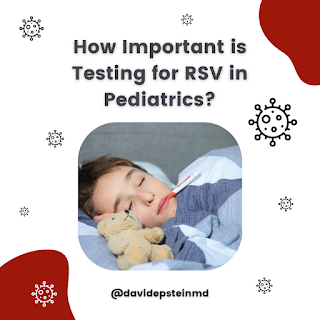We have seen schools and daycares asking parents to have their kids tested for respiratory syncytial virus (RSV) in a manner reminiscent of COVID-19 protocols. But, how important is testing for RSV? The pandemic has formed new public perspectives and expectations on viral testing. Testing for COVID-19 was meant to curb the spread of a virus in a pandemic that was overwhelming medical systems and causing significant morbidity and mortality. With RSV, the importance of identifying the virus by testing is based on a context that is different from what we’ve learned with COVID-19.
We’ve seen a lot of commentaries and reports in the news about RSV. Yes, the number of kids affected is higher than we’ve seen in the recent past. And, yes, we are seeing more pediatric hospitalizations from RSV. The major pediatric age group that is at greatest risk for hospitalization is children younger than 5 years of age. But, within that group, infants less than 6 months of age have the highest hospitalization rate. Of the pediatric patients without comorbid conditions, a majority of pediatricians and pediatric sub-specialists are most concerned about infants with RSV who are less than 1 year of age.
Identification of RSV has the purpose of knowing which virus one is dealing with and ruling out other reasons for an infant’s or child’s symptoms. The treatment of RSV is mainly supportive, meaning assisting the breathing as necessary and making sure that infants or children do not become dehydrated. Infants and young children become dehydrated because the respiratory symptoms generated from an RSV infection can impair their ability to feed and drink. There is no curative treatment for RSV in the outpatient setting and the preventative monoclonal antibody, palivizumab (Synagis), is only given to infants with comorbid conditions that would put them at risk of doing poorly with an RSV infection.
Pediatricians and pediatric subspecialists are not dismissive of the older kids with RSV. They just know that the infants suffer more from the infection and usually relegate RSV testing to the group that has the most trouble with the infection. Knowing that an infant has RSV will determine how closely that infant is monitored because the medical team knows that infants can get sick pretty quickly with RSV. Also, if an infant is known to have RSV, they won’t be subjected to extensive testing and unnecessary treatments as the diagnosis has already been confirmed.
The repercussions of RSV infections in older children are less significant and the assumption is that children with symptoms will stay home from school or daycare as they are supposed to do with any other “cold” or viral illness. Treatments for these infections usually involve routine home remedies. Indeed, there are toddlers who do end up in the pediatric intensive care unit with respiratory distress from RSV, but the risk is much lower than that of infants. So, with that in mind, routine testing of children for RSV is not mandatory in the outpatient setting. If a child is sick enough to end up in the hospital, testing is performed not for specific management (because management is based on controlling symptoms which don’t require a specific diagnosis) but for cohorting or isolation of patients to prevent spread to more vulnerable infants or children in the hospital and predicting the course of the illness.
While RSV is a problematic illness in the pediatric population, the illness is relatively predictable in its effects and its transmission, unlike COVID-19. Aside from epidemiological considerations and formulating public health mitigation strategies, testing for RSV does not change the direct medical management for a vast majority of infants and children who contract the virus. Pediatricians and pediatric subspecialists are very adept at monitoring and supporting even the most sick infants and kids with RSV. The public has become conditioned to the unpredictability of COVID-19 where testing has become a standard for assisting with management and control of an illness that has affected millions of people in an unprecedented fashion. So, most pediatricians and pediatric subspecialists would agree that universal testing for RSV or RSV testing advocated by schools or daycares in symptomatic or exposed, asymptomatic infants and children is not necessary or as important as it has been for COVID-19.
What are your thoughts about RSV testing in the pediatric population?

Comments
Post a Comment